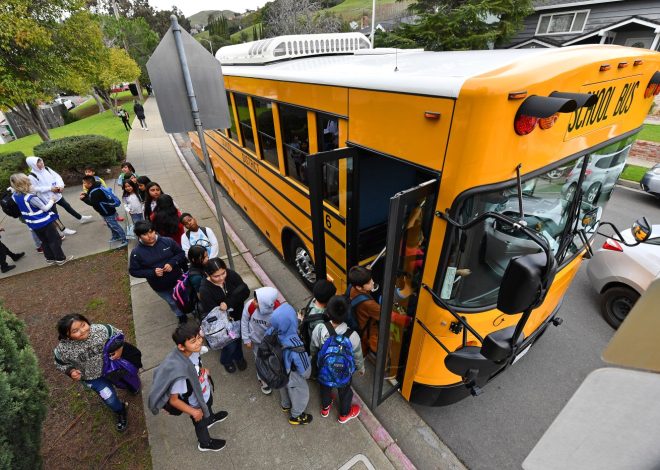
‘We will not abandon them’: Bay Area nonprofits scramble to support refugees after federal stop-work order
After waiting for several years, Shamiran, 18, and her family had less than two days to pack up and leave behind their lives in Iraq when they were granted permission to come to the United States as refugees. With only a few personal belongings, the family arrived in Chicago on Jan. 19.
Just one day after their arrival, President Donald Trump was inaugurated, and immediately issued an executive order pausing the U.S. refugee admission program for 90 days, prompting canceled flights for those waiting to come to the U.S. and leaving refugees who had been approved by the federal government stranded. Later that week, the Trump administration issued a stop-work order that froze the work of resettlement agencies and the local nonprofit affiliates that help refugees who have already arrived settle into their new homes.
The administration’s orders have left Bay Area nonprofits scrambling as their funding to support hundreds of refugees who have already arrived has disappeared — and have left recently arrived refugees fearful for their futures in the United States.
“It was devastating,” said Shamiran, who asked that her last name not be used due to her refugee status. “We need a little help before we can get on our feet.”
These nonprofits, which include Jewish Family Services of Silicon Valley and Jewish Family and Community Services East Bay, are often refugees’ “very first point of contact,” said Susan Frazer, CEO of JFS Silicon Valley — from picking the refugees up at the airport, often carrying no more than a backpack, to ensuring they have access to housing, social services and a pathway to a job.
The resettlement services, which are up to 90% federally funded, last for the first 90 days a refugee has arrived in the country, Frazer said. In addition to case management and assistance with basic needs such as food, the refugees are each given a one-time stipend of $1,650.
Now Shamiran and her family — and hundreds of other refugees in the Bay Area — are left without those services and cash assistance.
The executive order states that the United States “lacks the ability to absorb large numbers of migrants, and in particular, refugees, into its communities in a manner that does not compromise the availability of resources for Americans, that protects their safety and security, and that ensures the appropriate assimilation of refugees.”
Despite the stop-work order, nonprofits have reiterated their commitment to the refugees already here — but that work is difficult without funding, they said. The two JFS groups had a total of more than 200 refugees impacted.
“We are a values-driven organization who have made a commitment to a group of people who we are not going to leave homeless or hungry,” said Robin Mencher, CEO of JFCS East Bay. “We’ve got to find a way.”
Shamiran arrived along with her mother, brother and sister. Shamiran’s father was part of a democratic movement in Iraq and had been threatened for years; an earlier refugee case for the family was reopened in 2021 after his death.
“We were getting threatened, and we thought it would be safer if we came here,” Shamiran said. “We’d be closer to family as well because we had no one after my dad passed away.”
They arrived first in Chicago before traveling to San Jose to stay with family. Beyond help from JFS of Silicon Valley getting enrolled in local services, the only support Shamiran’s family received was $250 for the family and two bikes for her siblings, she said.
“We’re four people, so how much could it get for us?” Shamiran said. “It’s going to be a lot harder to do what I wanted to do — to get on my feet.”
Madhi, 30, another refugee who fled Afghanistan and finished his 90 days of service shortly before the stop-work order, said he would have been homeless without support.
“It’s going to be very hard,” he said through a translator. “They’re going to face lots of problems.”
Madhi, who asked that his last name not be used because he has family who remain in Afghanistan, is also fearful for relatives stuck due to the halt of refugee resettlement, and said they are in danger because they worked with the Americans for many years.
Many refugees waiting abroad had already been connected with local nonprofits to prepare for departure and had their tickets canceled without warning. JFCS East Bay had been working with 22 families ahead of their planned departures when their travel plans were abruptly canceled, Mencher said, including parents set to be reunited with their minor children.
Sayed Agha Dawlati, who lives in Concord, had traveled to Qatar to bring his five- and eight-year-old daughters to join the rest of his family in the United States when their travel plans and refugee status were canceled — which he described through a translator as a “shock.”
“It’s a very uncertain situation that I’m stuck in,” Dawlati said. “If I’m not in the U.S., I cannot support my family, and it’s like losing them as well.”
Originally from Afghanistan, the family was forced to separate when Dawlati could not secure green cards for two of his six children. His two daughters stayed with their grandparents in Afghanistan.
Now, Dawlati is facing an impossible decision because he cannot leave his two daughters alone in Qatar, but his family risks eviction if he does not return to work driving for Uber in Concord.
“They were really excited also to come to the U.S. and be with the other family members and join their mom and other kids,” he said. “When they were also talking with their mom, they would always say, ‘Oh, will you come to the airport to pick us up?’”
From left, students, who came from Ukraine, Olena Yavorska, Pavlo Pylypenko and his wife, Zhanna Pylypenko, and Natalia Zdikhovska, study English during an ESL class at Jewish Family Services in Los Gatos, Calif., on Wednesday, Feb. 5, 2025. (Dai Sugano/Bay Area News Group)
JFS of Silicon Valley and JFCS East Bay also provide services to refugees funded through other federal and state programs, such as the United States’s Office of Refugee Resettlement, but Frazer worries that this funding could be next on the chopping block. These programs include English-as-a-second-language classes, long-term assistance programs for refugees with severe trauma or PTSD and vocational programs — which serve not only resettled refugees but also refugees on special immigrant visas or humanitarian parole.
At a Feb. 6 ESL class, students from Afghanistan and Ukraine sat together in rows in a classroom at JFS’s South Bay office, where they listened to English music as they learned a new verb tense.
Sameer, who came from Afghanistan, speaks during an interview at Jewish Family Services in Los Gatos, Calif., on Wednesday, Feb. 5, 2025. (Dai Sugano/Bay Area News Group)
Many refugees said that without these classes, adapting to life in the United States would be harder. Sameer, an Afghan refugee who arrived with his family in January 2024 and who declined to share his last name because he has family remaining in Afghanistan, said these classes are allowing him to learn English so he can better support his four children. Olena Yavorska, who came to the Bay Area from Ukraine with her husband and two children, said she is working to improve her English so she can get a job.
Abe Wischnia, who has volunteered with JFS for three years as an English tutor, came to the United States as a refugee at five years old with his Holocaust survivor parents. Knowing the difficulties his parents faced not speaking English, he said that ESL programs help prepare refugees to find jobs through mock interviews and preparation for work environments.
Related Articles
Georgia-based Baptist group joins lawsuit to keep ICE out of churches
They entered the country legally to flee desperate conditions. Now, they could be deported
Bay Area counties to sue Trump over funding cuts to sanctuary communities
Opinion: Abandoning Afghans who worked with U.S. hurts our credibility
Tahoe-logo hats removed from stores after online post about immigrants’ kids
“Being in a strange place, learning a new language, trying to figure out how you’re going to survive — and then someone tells you that part of that program is going to be taken away?” he said, adding that the students have been asking questions about their future in the United States.
To fill in the funding gap to continue supporting refugees, both JFS of Silicon Valley and JFCS East Bay are turning to the community for help fundraising.
“We will not abandon them,” Frazer said. “We are committed to our mission, but we need help from the community. At this point, we can’t do it alone.”
Instructor Aura Parish teaches her ESL class at Jewish Family Services in Los Gatos, Calif., on Wednesday, Feb. 5, 2025. (Dai Sugano/Bay Area News Group)
An ESL student learns English during an ESL class at Jewish Family Services in Los Gatos, Calif., on Wednesday, Feb. 5, 2025. (Dai Sugano/Bay Area News Group)
Students, who came from Ukraine, study English during an ESL class at Jewish Family Services in Los Gatos, Calif., on Wednesday, Feb. 5, 2025. (Dai Sugano/Bay Area News Group)


